Daily Vocabulary Words: List of Daily Used Words in Leading Indian Newspapers
Hi there. Welcome to this special section @ Wordpandit. Our endeavour here is straightforward: highlighting daily vocabulary words that you would come across in leading newspapers in the country. We have included the following newspapers in our selection:
• The Times of India
• The Economic Times
• Hindustan Times
• Mint
• Indian Express
We are putting in extensive work to develop your vocabulary. All you have to do is be regular with this section and check out this post daily. This is your repository of commonly used words; essentially, we are posting a list of daily used words. Hence, this has significant practical application as it teaches you words that are commonly used in leading publications mentioned above.
Visit the website daily to learn words from leading Indian newspapers.
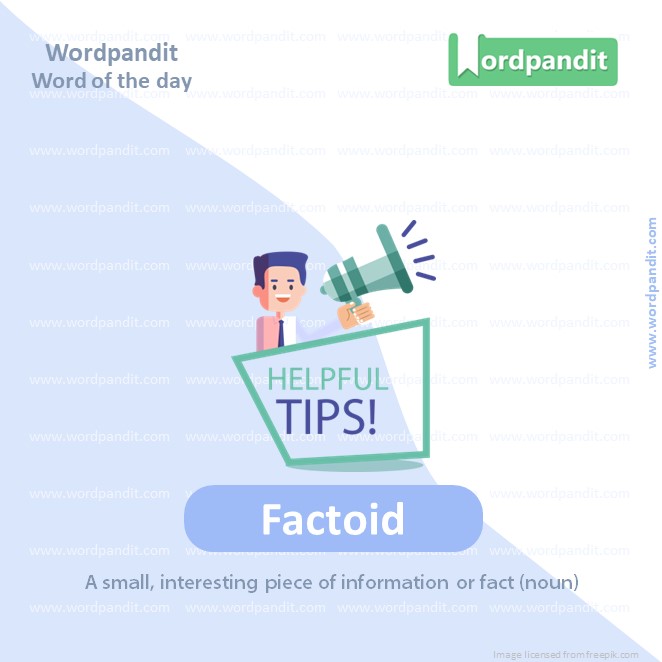
WORD-1: Factoid
CONTEXT: Another factoid that is encouraging is the steady journey of the reducing share of subsidies in the budget.
SOURCE: Hindustan Times
EXPLANATORY PARAGRAPH: You know how sometimes you hear really cool or interesting facts, like bees doing dances to talk to each other? Well, a “factoid” is a little fact that sounds interesting, but it might not always be true. It’s like a tiny piece of information that’s fun to know.
MEANING: A small, interesting piece of information or fact (noun).
PRONUNCIATION: FAK-toid
SYNONYMS: trivia, titbit, snippet, nugget, piece of information
USAGE EXAMPLES:
1. The internet is full of factoids about celebrities that may or may not be accurate.
2. She enjoys reading books filled with interesting factoids about animals.
3. Many factoids spread quickly on social media without being verified.
4. The article was filled with amusing factoids about historical events.
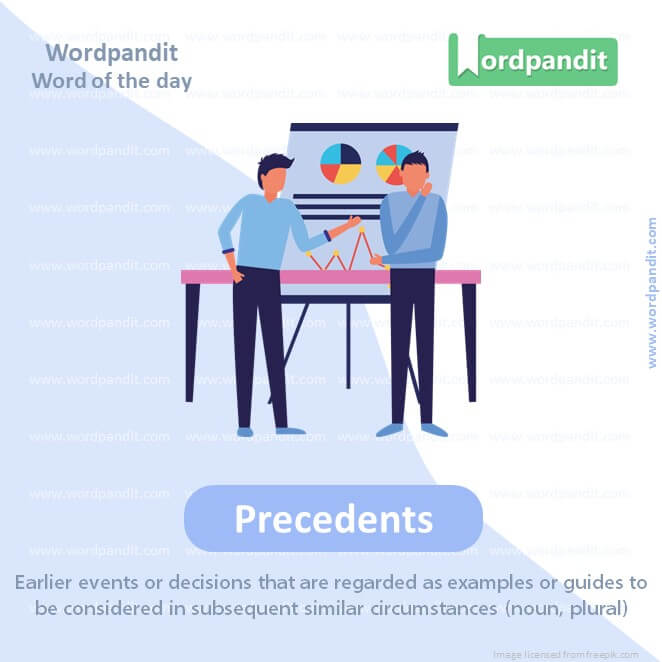
WORD-2: Precedent
CONTEXT: in other words, resettlement and rehabilitation were conditions precedent to evictions and demolitions, including for occupants and residents without formal title to land.
SOURCE: Hindustan Times
EXPLANATORY PARAGRAPH: You know when you ask your parents if you can have ice cream before dinner, and they say yes because you finished all your vegetables last night? That’s setting a “precedent.” It’s when something that happened before is used as an example or rule for what happens next.
MEANING: Earlier events or decisions that are regarded as examples or guides to be considered in subsequent similar circumstances (noun, plural).
PRONUNCIATION: PRES-uh-duhnt
SYNONYMS: example, model, standard, guideline, tradition
USAGE EXAMPLES:
1. The court’s decision set a precedent for future cases involving similar issues.
2. His behavior created a precedent for how employees should dress in the office.
3. The agreement established a precedent for cooperation between the two countries.
4. The president’s actions were criticized for breaking with established precedent.
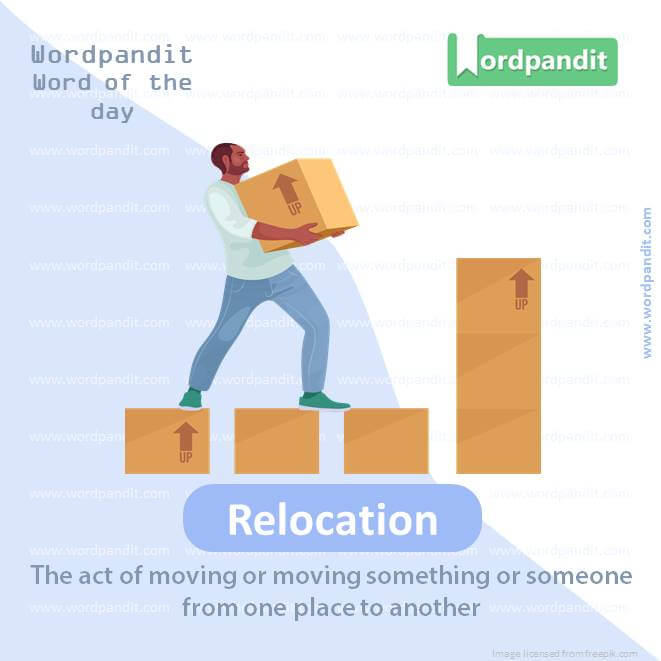
WORD-3: Relocation
CONTEXT: There was also an existing relocation scheme.
SOURCE: Hindustan Times
EXPLANATORY PARAGRAPH: Imagine if your family moved to a new house in a different neighborhood. That’s “relocation.” It’s when people or things move from one place to another, like when you move your toys to your friend’s house for a playdate.
MEANING: The act of moving or moving something or someone from one place to another.
PRONUNCIATION: ree-loh-KEY-shuhn
SYNONYMS: moving, migration, transfer, moving, shifting
USAGE EXAMPLES:
1. The company offered relocation assistance to employees who had to move for work.
2. After the flood, the government organized the relocation of affected families to temporary shelters.
3. His relocation to a new city brought many changes to his life.
4. The relocation of the zoo animals to a new habitat was carefully planned.
WORD-4: Reaffirmation
CONTEXT: a recent order of the Allahabad high court (HC) is important in its reaffirmation of the progressive ethos of the Constitution.
SOURCE: Hindustan Times
EXPLANATORY PARAGRAPH: Remember when you promised to be your best friend’s friend forever, and then you said it again just to make sure? That’s like “reaffirmation.” It’s when you say or do something again to show that you still mean it, like giving a double promise.
MEANING: Saying or doing something again to show that you still mean it (noun).
PRONUNCIATION: ree-uh-fur-MEY-shuhn
SYNONYMS: confirmation, validation, renewal, restatement, reiteration
USAGE EXAMPLES:
1. The president’s speech was a reaffirmation of his commitment to his campaign promises.
2. They exchanged vows as a reaffirmation of their love and commitment to each other.
3. The reaffirmation of the company’s values boosted employee morale.
4. The treaty was signed as a reaffirmation of the two countries’ friendship.
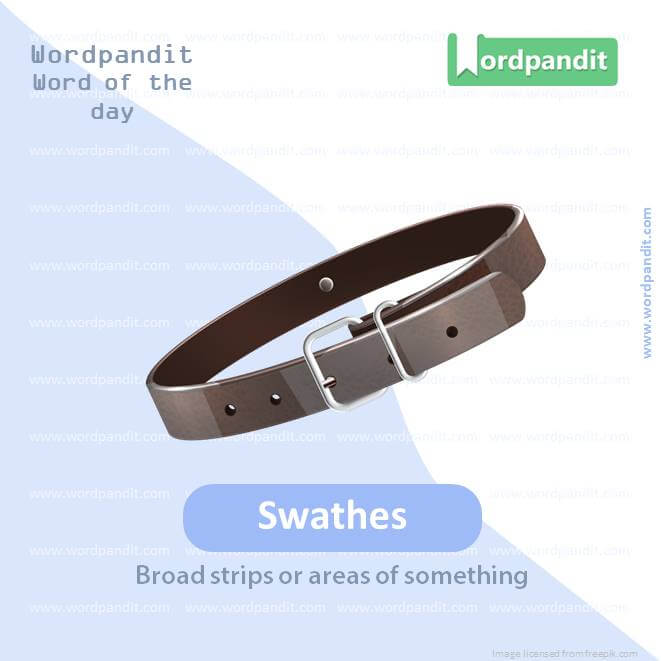
WORD-5: Swathes
CONTEXT: That is when the bulldozers arrive, homes are torn down, and swathes of people are evicted.
SOURCE: Hindustan Times
EXPLANATORY PARAGRAPH: Imagine wrapping yourself in a big, cozy blanket that covers you from head to toe. That’s like what “swathes” means. It’s when something covers a large area, like a giant blanket covering the ground.
MEANING: Broad strips or areas of something.
PRONUNCIATION: swahthz
SYNONYMS: stretches, expanses, areas, patches, stretches
USAGE EXAMPLES:
1. The wildfire destroyed large swathes of forest in the region.
2. The artist painted swathes of color across the canvas, creating a vibrant masterpiece.
3. The storm left swathes of destruction in its wake.
4. The politician promised to improve education across swathes of rural areas.
WORD-6: Non-reconciled
CONTEXT: One move that will clear the clutter of petty tax cases is the withdrawal of tax demands on the large number of “petty, non-verified, non-reconciled or disputed direct tax demands.
SOURCE: Hindustan Times
EXPLANATORY PARAGRAPH: You know when you and your friend have an argument, and you both still feel upset about it? That’s like “non-reconciled.” It means not resolving or making up after a disagreement, like when you still feel mad.
MEANING: Not resolving or making up after a disagreement (adjective).
PRONUNCIATION: non-rek-uhn-sahyld
SYNONYMS: unresolved, unhealed, unsettled, outstanding, unsorted
USAGE EXAMPLES:
1. The conflict between the two countries remained non-reconciled despite efforts to negotiate peace.
2. Their differences were left non-reconciled, causing tension in the workplace.
3. The issue remained non-reconciled, leading to further complications down the line.
4. The family feud remained non-reconciled for years, dividing relatives.
WORD-7: Pageantries
CONTEXT: The pomp and pageantries of high international diplomacy, therefore, provide a domestic boost.
SOURCE: Hindustan Times
EXPLANATORY PARAGRAPH: Have you ever seen a big parade with colorful costumes and floats? That’s a “pageantry.” It’s a fancy show or event with lots of decorations and performances, like a grand celebration.
MEANING: A fancy show or event with lots of decorations and performances (noun).
PRONUNCIATION: pey-juhn-tree
SYNONYMS: spectacle, extravaganza, display, show, ceremony
USAGE EXAMPLES:
1. The royal wedding was a pageantry watched by millions of people around the world.
2. The annual carnival is a pageantry of music, dance, and colorful costumes.
3. The opening ceremony of the Olympics is always a grand pageantry.
4. The parade was a pageantry of floats, marching bands, and costumed performers.
WORD-8: Pandering
CONTEXT: This was most recently evident in the above-mentioned immigration law where centrist Macron was perceived as pandering to the far-Right to pass a law that was intrinsic to his second-term pledges
SOURCE: Hindustan Times
EXPLANATORY PARAGRAPH: You know when someone tries to make you happy by giving you exactly what you want, even if it might not be good for you? That’s “pandering.” It’s when someone does things just to please others, even if it’s not the right thing to do.
MEANING: Doing things just to please others, even if it’s not the right thing to do (verb).
PRONUNCIATION: PAN-der-ing
SYNONYMS: appeasing, flattering, indulging, gratifying, catering
– USAGE EXAMPLES:
1. The politician was accused of pandering to special interest groups for votes.
2. He criticized the media for pandering to sensationalism instead of reporting facts.
3. The company was accused of pandering to consumer trends rather than focusing on quality.
4. She refused to pander to her boss’s unreasonable demands.
WORD-9: Trilaterals
CONTEXT: This has created the foundations for strong maritime cooperation in security areas including illegal fishing and anti-piracy as well as enabled trilaterals with “like-minded” nations such as Australia and the United Arab Emirates.
SOURCE: Hindustan Times
EXPLANATORY PARAGRAPH: Imagine playing a game where you have to work together with two friends on a team. That’s like a “trilateral.” It’s when three parties or groups come together to discuss or work on something, like a group project with three members.
MEANING: Three parties or groups coming together to discuss or work on something (noun).
PRONUNCIATION: trahy-lat-er-uhls
SYNONYMS: tripartite, three-way, three-party, trilateral, three-sided
USAGE EXAMPLES:
1. The trilateral meeting between the leaders of the three countries aimed to address regional security issues.
2. The trilateral agreement was reached after months of negotiations.
3. The trilateral talks focused on economic cooperation and trade.
4. The trilateral summit resulted in a joint statement outlining future collaboration.
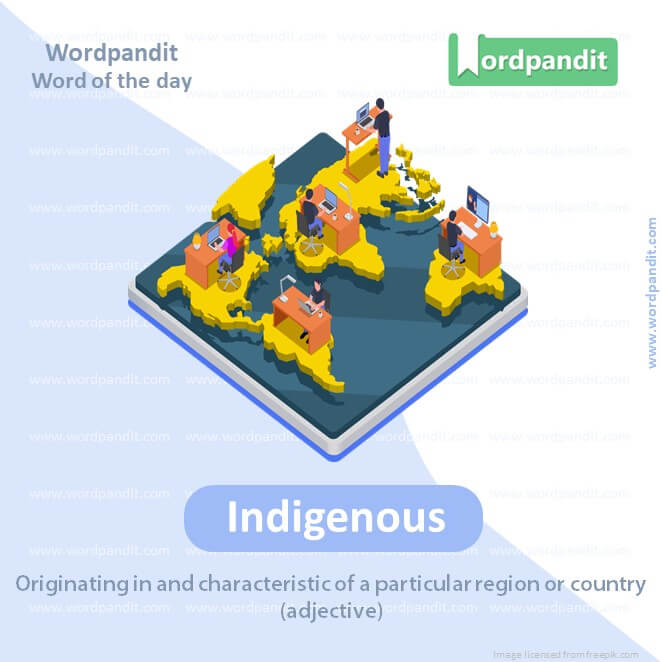
WORD-10: Indigenous
CONTEXT: India initiative that requires technology transfers and advanced know-how for indigenous equipment.
SOURCE: Hindustan Times
EXPLANATORY PARAGRAPH: You know how your grandma makes that special soup recipe that’s been in your family for generations? That’s because she’s making something “indigenous” to your family. It means something that’s native or original to a certain place or group of people, like your grandma’s soup.
MEANING: Originating in and characteristic of a parti cular region or country (adjective).
PRONUNCIATION: in-DIJ-uh-nuhs
SYNONYMS: native, original, aboriginal, endemic, local
USAGE EXAMPLES:
1. The indigenous people of the region have lived there for thousands of years.
2. The festival celebrates the indigenous culture of the area.
3. The museum exhibits artifacts belonging to the indigenous tribes of the region.
4. Efforts are being made to preserve the languages of indigenous communities.
Vocabulary Daily Use
In the fascinating world of language learning, we often concentrate on taking giant leaps, but the real magic lies in the small steps of ‘vocabulary daily use’. These frequently used words and phrases form the backbone of practical communication and understanding. Therefore, mastering ‘vocabulary daily use’ is a crucial element in achieving language fluency.
To effectively learn ‘vocabulary daily use’, one needs to venture beyond the traditional textbook resources. The real essence of these words unveils itself in everyday exposure and interactions. Engaging with a variety of material like novels, magazines, newspapers, podcasts, films and digital content deepens the understanding of ‘vocabulary daily use’. Immersion in these contexts yield natural, everyday language that bridges the gap between the classroom and the real world.
The journey of mastering ‘vocabulary daily use’ necessitates the integration of innovative memory techniques. Flashcards and the Leitner System aid in embedding these words into your long-term memory by promoting active recall. Additionally, the use of mnemonic devices, which allow you to associate ‘vocabulary daily use’ with personal and familiar narratives, can enhance your ability to remember and recall these words.
Moreover, it’s important to remember that ‘vocabulary daily use’ isn’t just about comprehension- it’s about practice and active usage. Incorporate these words in your day-to-day communication and social interactions. This not only solidifies your understanding but also accelerates learning and internalization of ‘vocabulary daily use’.
In a nutshell, mastering ‘vocabulary daily use’ is a continual process that demands exposure, creative learning strategies and assertive practice. The commingling of these tactics brews the perfect formula that allows learners to seamlessly integrate ‘vocabulary daily use’ into their linguistic repertoire. And with that, they can navigate the nuances of language with confidence and ease.










